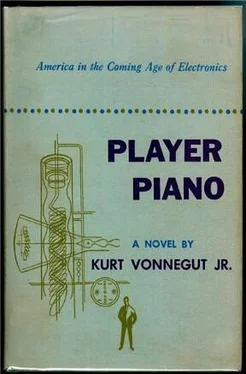Something made Paul want to be someone other than who he was. "Got a little grocery store," he said.
"Need a guy who's handy with his hands?"
"Not just now. Things are pretty slow."
The man was scrawling something on a piece of paper. He held the paper against the hood, and twice punched his pencil through the paper as the pencil crossed a crack. "Here - here's my name. If you've got machines, I'm the guy that can keep them going. Put in eight years in the works as a millwright before the war, and anything I don't know, I pick up fast." He handed the paper to Paul. "Where you going to put it?"
Paul slipped the paper under the transparent window in his billfold, over his driver's license. "There - right on top." He shook the man's hand and nodded to the others. "Thanks."
The motor took hold with assurance and swept Paul over the hilltop and up to the gate of the Ilium Works. A watchman waved from his pillbox, a buzzer sounded, and the iron, high-spiked gate swung open. He came now to the solid inner door, honked, and looked expectantly at a thin slit in the masonry, behind which another guard sat. The door rumbled upward, and Paul drove up to his office building.
He went up the steps two at a time - his only exercise - and unlocked two outer doors that led him into Katharine's office, and beyond that, his own.
Katharine hardly looked up when he came in. She seemed lost in melancholy, and, on the other side of the room, on the couch that was virtually his, Bud Calhoun was staring at the floor.
"Can I help?" said Paul.
Katharine sighed. "Bud wants a job."
"Bud wants a job? He's got the fourth-highest-paid job in Ilium now. I couldn't equal what he gets for running the depot. Bud, you're crazy. When I was your age, I didn't make half -"
"Ah want a job," said Bud. "Any job."
"Trying to scare the National Petroleum Council into giving you a raise? Sure, Bud, I'll make you an offer better than what you're getting, but you've got to promise not to take me up on it."
"Ah haven't got a job any more," said Bud. "Canned."
Paul was amazed. "Really? What on earth for? Moral turpitude? What about the gadget you invented for -"
"Thet's it," said Bud with an eerie mixture of pride and remorse. "Works. Does a fine job." He smiled sheepishly. "Does it a whole lot better than Ah did it."
"It runs the whole operation?"
"Yup. Some gadget."
"And so you're out of a job."
"Seventy-two of us are out of jobs," said Bud. He slumped even lower in the couch. "Ouah job classification has been eliminated. Poof." He snapped his fingers.
Paul could see the personnel manager pecking out Bud's job code number on a keyboard, and seconds later having the machine deal him seventy-two cards bearing the names of those who did what Bud did for a living - what Bud's machine now did better. Now, personnel machines all over the country would be reset so as no longer to recognize the job as one suited for men. The combination of holes and nicks that Bud had been to personnel machines would no longer be acceptable. If it were to be slipped into a machine, it would come popping right back out.
"They don't need P-128's any more," said Bud bleakly, "and nothing's open above or below. Ah'd take a cut, and go back to P-129 or even P-130, but it's no dice. Everything's full up."
"Got any other numbers, Bud?" said Paul. "The only P-numbers we're authorized are -"
Katharine had the Manual open before her. She'd already looked the numbers up. "P-225 and P-226 - lubrication engineers," she said. "And Doctor Rosenau's got both of those."
"That's right, he does," said Paul. Bud was in a baffling mess, and Paul didn't see how he could help him. The machines knew the Ilium Works had its one allotted lubrication engineer, and they wouldn't tolerate a second. If Bud were recorded as a lubrication engineer and introduced into the machines, they'd throw him right out again.
As Kroner often said, eternal vigilance was the price of efficiency. And the machines tirelessly riffled through their decks again and again and again in search of foot draggers, free riders, and misfits.
"You know it isn't up to me, Bud," said Paul. "I haven't got any real say about who's taken on."
"He knows that," said Katharine. "But he has to start somewhere, and we thought maybe you'd know of some opening, or who to see."
"Oh, it makes me sore," said Paul. "Whatever got into them to give you a Petroleum Industries assignment, anyway? You should be in design."
"Got no aptitude for it," said Bud. "Tests proved that."
That would be on his ill-fated card, too. All his aptitude-test grades were on it - irrevocably, immutable, and the card knew best. "But you do design," said Paul. "And you do it with a damn sight more imagination than the prima donnas in the Lab." The Lab was the National Research and Development Laboratory, which was actually a war-born conglomeration of all the country's research and development facilities under a single headquarters. "You're not even paid to design, and still you do a better job of it than they do. That telemetering arrangement for the pipeline, your car, and now this monster that runs the depot -"
"But the test says no," said Bud.
"So the machines say no," said Katharine.
"So that's that," said Bud. "Ah guess."
"You might see Kroner," said Paul.
"Ah tried, and didn't get past his secretary. Ah told her Ah was after a job, and she called up Personnel. They ran mah card through the machines while she held the phone; and then she hung up, and looked sad, and said Kroner had meetings all month."
"Maybe your university can help," said Paul. "Maybe the grading machine needed new tubes when it went over your development aptitude test." He spoke without conviction. Bud was beyond help. As an old old joke had it, the machines had all the cards.
"Ah've written, asking them to check my grades again. No matter what Ah say, Ah get the same thing back." He threw a piece of graph paper on Katharine's desk. "Theah. Ah've written three letters, and gotten three of these back."
"Uh-huh," said Paul, looking at the familiar graph with distaste. It was a so-called Achievement and Aptitude Profile, and every college graduate got one along with his sheepskin. And the sheepskin was nothing, and the graph was everything. When time for graduation came, a machine took a student's grades and other performances and integrated them into one graph - the profile. Here Bud's graph was high for theory, there low for administration, here low for creativity, and so on, up and down across the page to the last quality - personality. In mysterious, unnamed units of measure, each graduate was credited with having a high, medium, or low personality. Bud, Paul saw, was a strong medium, as the expression went, personality-wise. When the graduate was taken into the economy, all his peaks and valleys were translated into perforations on his personnel card.
"Well, thanks anyway," said Bud suddenly, gathering up his papers, as though embarrassed at having been so weak as to bother anyone with his troubles.
"Something will turn up," said Paul. He paused at his office door. "How are you fixed for money?"
"They're keepin' me on a few more months, until all the new equipment gets installed. And Ah've got the award from the suggestion system."
"Well, thank God you got something out of it. How much?"
"Five hundred. It's the biggest one this year."
"Congratulations. Is that on your card?"
Bud held the rectangle of cardboard up to the window and squinted at the nicks and perforations. "Think thet little devil raht there's it."
"That's for your smallpox vaccination," said Katharine, looking over his shoulder. "I've got one of those."
"No, the little triangle next to thet one."
Читать дальше








![Курт Воннегут - Вампитеры, фома и гранфаллоны [litres]](/books/397997/kurt-vonnegut-vampitery-foma-i-granfallony-litre-thumb.webp)